译林版牛津英语7上
牛津译林版英语七年级上册Unit1 Reading 课件
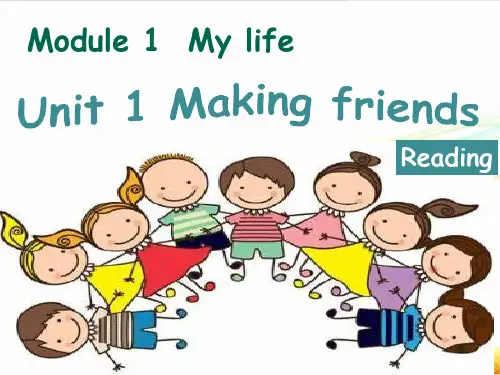
Look at the pictures, the title and the sub-headings on P3. Then tick (√) the things that you may find in Anna's blog.
1 her country
□√
2 her age
□√
3 her parents' names □
Now try to introduce yourself to your partner from these aspects.
•Name: •Country: •Age: •What you look like: •Family members: •Hobbies:
1.Hello, everyone.
are
4.aaTlhlhevaseepCorfp1yatyrfhDereiomewnyybdoolrfuyadn.vksiocniuenorwaiintteatdhlhiekcosibmn?bdeFieaisnn.idngs
a thoinugtsthIemcuosrtredcot answers. (P 4)
Read Para. 3 and 4 and answer the questions.
1.How does she go to school? She goes to school by school bus.
2.What are her favourite subjects? Maths, Art and Science.
5.What does “e-friend” mean to Hi? It means a friend from the Internet.
牛津译林版英语七年级上册分单元知识点归纳总结(Unit1-8))
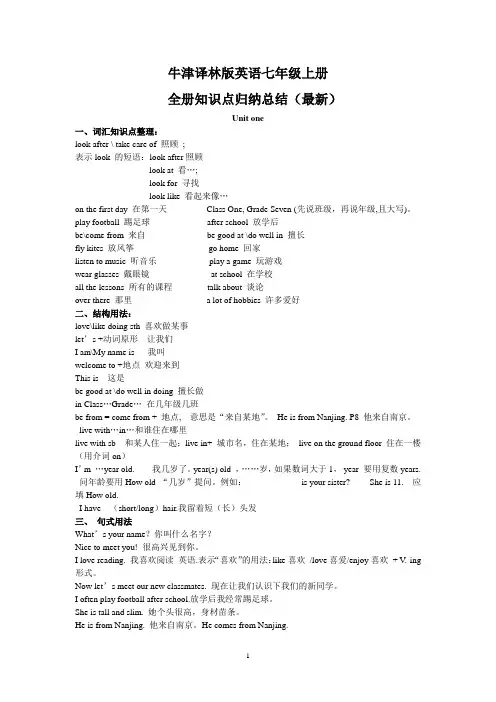
牛津译林版英语七年级上册全册知识点归纳总结(最新)Unit one一、词汇知识点整理:look after \ take care of 照顾;表示look 的短语:look after照顾look at 看…;look for 寻找look like 看起来像…on the first day 在第一天Class One, Grade Seven (先说班级,再说年级,且大写)。
play football 踢足球after school 放学后be\come from 来自be good at \do well in 擅长fly kites 放风筝go home 回家listen to music 听音乐play a game 玩游戏wear glasses 戴眼镜at school 在学校all the lessons 所有的课程talk about 谈论over there 那里 a lot of hobbies 许多爱好二、结构用法:love\like doing sth 喜欢做某事let’s +动词原形让我们I am\My name is 我叫welcome to +地点欢迎来到This is 这是be good at \do well in doing 擅长做in Class…Grade…在几年级几班be from = come from + 地点, 意思是“来自某地”。
He is from Nanjing. P8 他来自南京。
live with…in…和谁住在哪里live with sb 和某人住一起;live in+ 城市名,住在某地;live on the ground floor 住在一楼(用介词on)I’m …year old. 我几岁了。
year(s) old ,……岁,如果数词大于1,year 要用复数years. 问年龄要用How old “几岁”提问。
例如:- is your sister? --- She is 11. 应填How old.I have (short/long)hair.我留着短(长)头发三、句式用法What’s your name?你叫什么名字?Nice to meet you! 很高兴见到你。
牛津译林版七年级上册(2024)Unit 4 School day 语言点和语法点整理
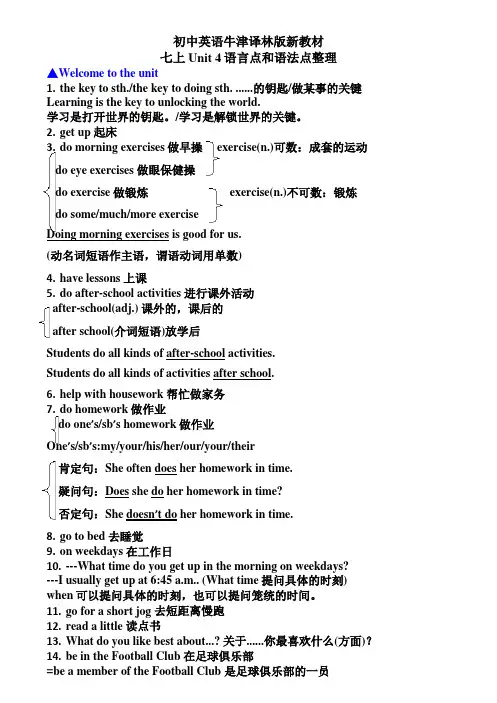
初中英语牛津译林版新教材七上Unit 4语言点和语法点整理▲Welcome to the unit1.the key to sth./the key to doing sth. ......的钥匙/做某事的关键Learning is the key to unlocking the world.学习是打开世界的钥匙。
/学习是解锁世界的关键。
2.get up 起床3.do morning exercises做早操 exercise(n.)可数:成套的运动 do eye exercises 做眼保健操do exercise 做锻炼 exercise(n.)不可数:锻炼do some/much/more exerciseDoing morning exercises is good for us.(动名词短语作主语,谓语动词用单数)4.have lessons 上课5.do after-school activities 进行课外活动after-school(adj.) 课外的,课后的after school(介词短语)放学后Students do all kinds of after-school activities.Students do all kinds of activities after school.6.help with housework 帮忙做家务7.do homework做作业do one’s/sb’s homework做作业One’s/sb’s:my/your/his/her/our/your/their肯定句:She often does her homework in time.疑问句:Does she do her homework in time?否定句:She doesn’t do her homework in time.8.go to bed 去睡觉9.on weekdays 在工作日10.---What time do you get up in the morning on weekdays?---I usually get up at 6:45 a.m.. (What time提问具体的时刻) when可以提问具体的时刻,也可以提问笼统的时间。
Unit3课文翻译2024-2025学年新牛津译林版英语七年级上册
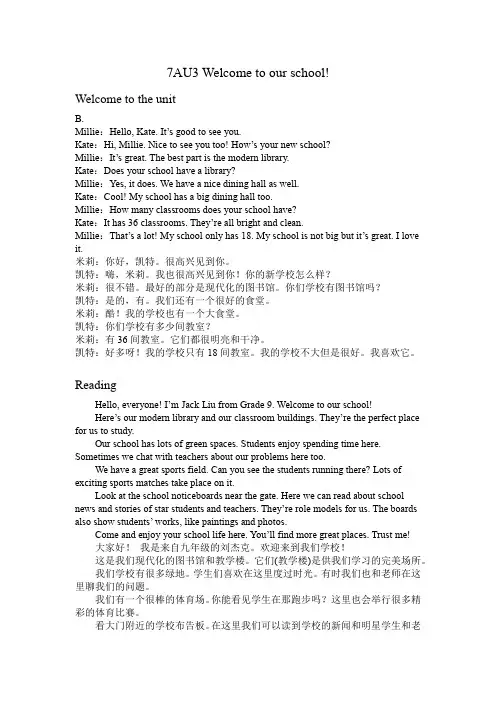
7AU3 Welcome to our school!Welcome to the unitB.Millie:Hello, Kate. It’s good to see you.Kate:Hi, Millie. Nice to see you too! How’s your new school?Millie:It’s great. The best part is the modern library.Kate:Does your school have a library?Millie:Yes, it does. We have a nice dining hall as well.Kate:Cool! My school has a big dining hall too.Millie:How many classrooms does your school have?Kate:It has 36 classrooms. They’re all bright and clean.Millie:That’s a lot! My school only has 18. My school is not big but it’s great. I love it.米莉:你好,凯特。
很高兴见到你。
凯特:嗨,米莉。
我也很高兴见到你!你的新学校怎么样?米莉:很不错。
最好的部分是现代化的图书馆。
你们学校有图书馆吗?凯特:是的,有。
我们还有一个很好的食堂。
米莉:酷!我的学校也有一个大食堂。
凯特:你们学校有多少间教室?米莉:有36间教室。
它们都很明亮和干净。
凯特:好多呀!我的学校只有18间教室。
我的学校不大但是很好。
我喜欢它。
ReadingHello, everyone! I’m Jack Liu from Grade 9. Welcome to our school!Here’s our modern library and our classroom buildings. They’re the perfect place for us to study.Our school has lots of green spaces. Students enjoy spending time here. Sometimes we chat with teachers about our problems here too.We have a great sports field. Can you see the students running there? Lots of exciting sports matches take place on it.Look at the school noticeboards near the gate. Here we can read about school news and stories of star students and teachers. They’re role models for us. The boards also show students’ works, like paintings and photos.Come and enjoy your school life here. You’ll find more great places. Trust me!大家好!我是来自九年级的刘杰克。
Unit7grammar课件牛津译林版英语七年级上册
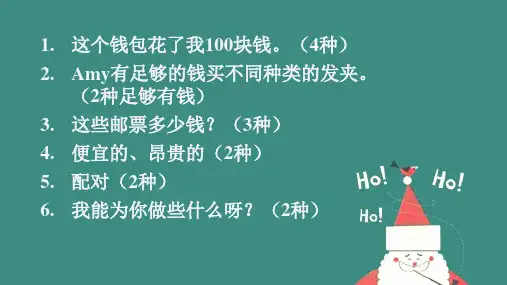
(question)
We need some juice. 否定句: We don’t need any juice. 疑问句: Do you need any juice?
在表示请求或征求意见的疑问句中希望 得到对方的肯回答时,通常用some.
Would you like some juice? (建议) Can I have some hamburgers? (请求)
• Is there an orange on the table? • Is there any juice on the table? • Are there any bananas on the table?
No, there isn’t. Yes, there is. Yes, there are.
Talk about your dream shop. What do you have in your dream shop?
There is/are…
There are two cats and a dog in the picture. There is a dog and two cats in the picture.
1. 这个钱包花了我100块钱。(4种) 2. Amy有足够的钱买不同种类的发夹。
(2种足够有钱) 3. 这些邮票多少钱?(3种) 4. 便宜的、昂贵的(2种) 5. 配对(2种) 6g
Grammar
Let’s have a Christmas party !
6. There are three kilos of pork in the shopping bag. (对划线部分提问) _H_o_w_ _m_u__ch_ pork _is__ there in the shopping bag?
牛津译林版英语七上Unit 5《Let’s celebrate》(Integrated skills
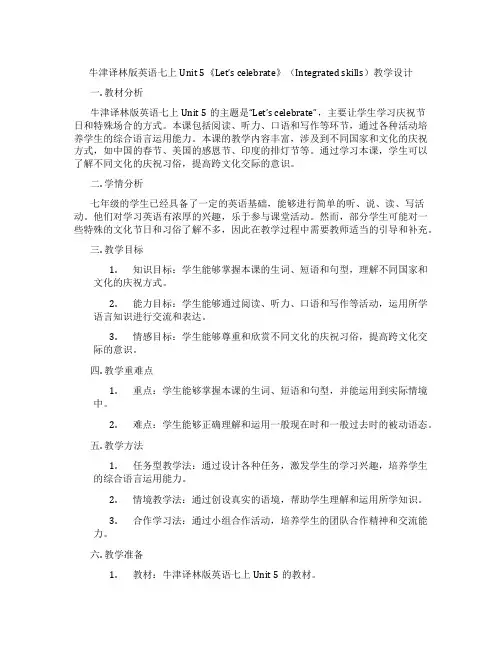
牛津译林版英语七上Unit 5《Let’s celebrate》(Integrated skills)教学设计一. 教材分析牛津译林版英语七上Unit 5的主题是“Let’s celebrate”,主要让学生学习庆祝节日和特殊场合的方式。
本课包括阅读、听力、口语和写作等环节,通过各种活动培养学生的综合语言运用能力。
本课的教学内容丰富,涉及到不同国家和文化的庆祝方式,如中国的春节、美国的感恩节、印度的排灯节等。
通过学习本课,学生可以了解不同文化的庆祝习俗,提高跨文化交际的意识。
二. 学情分析七年级的学生已经具备了一定的英语基础,能够进行简单的听、说、读、写活动。
他们对学习英语有浓厚的兴趣,乐于参与课堂活动。
然而,部分学生可能对一些特殊的文化节日和习俗了解不多,因此在教学过程中需要教师适当的引导和补充。
三. 教学目标1.知识目标:学生能够掌握本课的生词、短语和句型,理解不同国家和文化的庆祝方式。
2.能力目标:学生能够通过阅读、听力、口语和写作等活动,运用所学语言知识进行交流和表达。
3.情感目标:学生能够尊重和欣赏不同文化的庆祝习俗,提高跨文化交际的意识。
四. 教学重难点1.重点:学生能够掌握本课的生词、短语和句型,并能运用到实际情境中。
2.难点:学生能够正确理解和运用一般现在时和一般过去时的被动语态。
五. 教学方法1.任务型教学法:通过设计各种任务,激发学生的学习兴趣,培养学生的综合语言运用能力。
2.情境教学法:通过创设真实的语境,帮助学生理解和运用所学知识。
3.合作学习法:通过小组合作活动,培养学生的团队合作精神和交流能力。
六. 教学准备1.教材:牛津译林版英语七上Unit 5的教材。
2.多媒体设备:电脑、投影仪等。
3.教学资源:相关的文化背景资料、图片、视频等。
七. 教学过程1.导入(5分钟)教师通过向学生提问:“Do you like festivals?”引导学生谈论自己喜欢的节日,激发学生的学习兴趣。
七年级英语上册-各课详细练习及答案-译林牛津版
七年级英语上册各课详细练习及答案译林牛津版目录Unit 1 This is me! 1Unit 2 My day 16Unit 3 Let’s celebrate! 31Unit 4 Food 45Unit 5 Going shopping 60Unit6 Fashion 73}Answers88!~{Unit 1 This is me!%Welcome to the unit一、词组翻译:1. 一只电子狗______________2. 我的主人__________________3. 看书_____________________4. 早上好__________________5. 如何照顾Kitty_______________6. 晚上好_________________7. 遇到新朋友____________ 8. 晚安_____________________________ 9. 北京阳光中学_____________________ 10. 他们第一堂英语课__________________二、选择填空:…( )1. This is a very interesting book with lots of new words. Please ______ it carefully.A. lookB. seeC. look atD. read( )2. I really love sports. Can you tell me how ___ like a good swimmerA. swimsB. to swimmingC. to swimD. swimming ( )3. The teacher asks the students to write an article______ the Mid-Autumn Day.A. inB. ofC. aboutD. at( )4. Please introduce yourselves ______ each other.A. toB. withC. andD. about—( )5. Excuse ______, are ______my new classmateA. me, youB. my, yourC. I, youD. me, your( )6. Let’s ______ each other.A. make friendsB. make friends toC. make friend withD. make friends with( )7. — ___________ — My name is Mark.A. Are you MarkB. What’s this in EnglishC. Hello, Mark.D. What’s your name( )8. What ______ your sister’s nameA. areB. doesC. isD. were,( )9. —It’s time to go to bed, Lily! — Ok. ______, Mummy.A. Good morning.B. Good afternoon.C. Good eveningD. Good night( )10. Here is a bag. Could you carry________ for the old manA. itB. itsC. it’sD. them三、动词填空:1. Sandy and Lucy __________ (be) in the same class.2. Do you __________ (know) that girl3. Daniel __________ (wear) glasses every day.、4. Millie often __________ (fly) a kite with her brother.5. She __________ (not like) comic books.6. Does Simon __________ (watch) TV on Saturday7. —Where does he have lunch— He always__________ (have) lunch at school.8. They want __________ (play) table tennis.9. Dave usually __________ (go) running in the morning.10. Cats enjoy __________ (eat) fish.—四、完成对话:(A)L: Hello.M: Hi!L: My name __________ Liu Mei. __________ your nameM: __________ Mike.L: Nice to meet you!M: __________ __________ __________ __________, too.$L: __________ be friends.(B)Joan: Good morning!Ann: __________ __________!Joan: __________ __________ __________Ann: My name is Ann.Joan: Nice to meet you.Ann: __________ __________ __________ __________, __________.@Joan: Welcome to our school.Ann: __________ __________.Reading(1)一、词组翻译:1. 戴眼镜___________2. 喜欢阅读__________________________3. 读书俱乐部__________________4. 喜欢跳舞___________________5. 努力学习_______________6. 喜欢玩电脑游戏____________________7. 擅长游泳_______________8. 出生于____________________________ -9. 居住在苏州______________ 10.来自北京__________________________二、根据句意和汉语注释,在空格内写出各单词的正确形式:1. His father is a kind man. He is very __________(乐于助人)can find Millie in the__________(阅读)room.3. Do you want __________(居住)in Shanghai4. She __________(有)black hair and big eyes.5. Mary enjoys __________(游泳)in summer.6. He is a __________(有趣)boy. We all like him.^7. Are you good at __________(跳舞)8. I was __________(出生)in Shanghai.9. The man with __________(眼镜)is my English teacher.10. We are __________(主人)of our country.三、选择填空:( )1. Where ______ my glasses I can’t find______.A.is, itB. does, itC. are, themD. do, them( )2. My cousin is ______.。
新版译林版牛津初中英语七年级上册单词
10.礼物
11.确知
12.也许
13.对……感兴趣
14.邮票
15.收集
16.别客气
17.店主
18.稍等片刻
19.看一看
20.值多少钱
21.便宜的
22.最近的
23.发卡
24.般配
25.粉红色的
26.漂亮的
27.足够的
28.零头
29.与……不同
30.纸
31.项目
32.体恤衫
33.大部分
34.贫穷的
Unit 1
1.主人
2.年级
3.学生
4.阅读
5.同班同学
6.放学后
7.苗条的
8.擅长于
9.穿过
10.教室
11.舞蹈
12.游泳
13.年龄
14.相貌
15.容貌
16.可爱的
17.讨人喜欢的
18.业余爱好
19.每人
20.高兴的
21.来自
22.眼镜
Unit 2
1.散步
2.的确
3.碗
4.盆
5.次
6.网球
7.排球
33.费时
34.起床
35.去上学
36.阅览室
37.只有
38.当然
39.种类
40.各种各样的
41.借用
42.信
43.不多的
44.一些
45.离开
46.远离
47.走路
48.最好的
49.一切顺利
Unit4
1.醒来
2.表示提出或征求意见
3.小山
4.很少
5.出来
6.出去
7.吃早中晚饭
8.需要
9.休息
10.只是
牛津译林版七年级上册英语Unit1知识点汇总
牛津译林版七年级上册英语Unit1知识点汇总7A Unit 1 This is me!一.【精选短语】1. how to look after your e-dog如何照顾你的电子狗(1)疑问词+动词不定式(2)look after=take care of 照顾,照料2. Good evening.晚上好。
(晚上见面问候语)→比较:Good night.晚安。
(晚上分别时用语)3. love playing football after school喜爱放学后踢足球【知识链接】Love/like doing sth.喜欢做某事,强调习惯上的喜欢;Love/like to do sth.强调的是某一次的行为。
e.g. She loves watching TV, but today she loves to listen to music. Love的用法⑴vt.喜爱e.g. ①He loves his parents. (不能用like代替love)②She loves music.她爱好音乐。
⑵vt.热爱e.g. We love our motherland.我们热爱祖国。
⑶n.爱;挚爱a mother’s love for her children母亲对孩子的爱②fall in love with sb爱上…,e.g. He fell in love with her.③我们可在书信的结尾处看到例如Love Mary这样的署名,意思是With my love, Mary,一方面表示情感,一方面表示道别。
【用法拓展】lovely美丽的;可爱的e.g. lovely hair秀发,a lovely girl美丽的少女4. be good at sth/doing sth=do well in sth/doing sth擅长;在某方面表现好【知识链接】⑴He is good at telling funny jokes.⑵She always does well in English.5. wear glasses戴眼镜→ wear后接服装、装饰品等,表示“穿、戴”。
语法汇总牛津译林版英语七年级上册
Unit 1--2【语法精讲】一、一般现在时的构成主要用动词原形_______/________表示,如果主语是第三人称单数,则用动词的________。
e.g. He is an interesting actor. We all like him.【小试牛刀】1. Amy and Kitty are good friends.否定句:____________________________________.一般疑问句:________________________________?特殊疑问句:________________________________?2. She does his homework every night.否定句:____________________________________.一般疑问句:________________________________?特殊疑问句:________________________________?二、一般现在时的用法1.表示经常性或习惯性的动作或存在的状态。
常与频率的副词和时间状语连用。
时间状语:______________________________________________________.频率副词进行排序:______________________________________________.★频度副词的位置一般放在be动词__________,行为动词__________.[译]①她有时很忙。
She __________________________________________.②我们经常去那儿。
We_______________________________________.★对频度副词提问要用______________.[例]Isometimes write to my cousin Andy.(对划线部分提问)__________________ do you write to your cousin Andy?【小试牛刀】1. I don’t think fast food is good for our health, so I __________ go to McDonald’s.A. seldomB. alwaysC. usuallyD. often2. --Steve, _______ do you play basketball after school?--Twice a week. It can keep me healthy.A. how farB. how soonC. how longD. how often★2.表示_______________________e.g.The earth______________(be) round.在时间状语从句和条件状语从句中,主句是___________,从句用_____________。
- 1、下载文档前请自行甄别文档内容的完整性,平台不提供额外的编辑、内容补充、找答案等附加服务。
- 2、"仅部分预览"的文档,不可在线预览部分如存在完整性等问题,可反馈申请退款(可完整预览的文档不适用该条件!)。
- 3、如文档侵犯您的权益,请联系客服反馈,我们会尽快为您处理(人工客服工作时间:9:00-18:30)。
unit 3 课后作业
日期:授课人:学生:
一. 单项选择
( ) 1. -- What's the date today?
-- It's .
A. Sunday
B. on Sunday
C. September 9
D. on September 9
( ) 2. -- Don't stand me. I can't see the blackboard.
-- I'm sorry.
A. next
B. behind
C. in the front of
D. in front of
( ) 3. Don't worry! Let me you after .
A. help; a class
B. help; class
C. to help; the class C. to help; class
( ) 4. -- How long does it take us to Shanghai plane?
-- About one and a half hours.
A. to go; in
B. go; by
C. to go; by
D. go; in
( ) 5. -- Do you want at five in the afternoon?
-- Sure.
A. get home
B. get to school
C. to go there
D. to go to there
( ) 6. -- We're going to have a basketball match with Class 3.
-- .
A. Wish you good luck
B. Let me see
C. Thank you
D. Have a good time
二. 完成下列句子
1. -- 你们经常在哪里开家长会?-- 在学校礼堂。
-- Where do you often have ?
-- At the .
2. 这个图书馆有各种各样的书。
There are books in the library.
3. 谢谢你带领我们参观一下你的学校。
Thanks us your school.
4. 吉姆在课后帮助同学学英语。
Jim helps his classmates learn English .
5. 米莉到达学校要花二十分钟。
It Millie 20 minutes to school.
三. 阅读理解
Mr Smith is a teacher. He is near-sighted(近视的). But he doesn't wear glasses. One day, he is walking in a street. He is thinking something. Suddenly a strong wind blows his cap off his head. Mr Smith runs after it. He wants to catch it but he can't. At this time, an old woman from a door of the house says to him.
"Hi! What are you doing,sir?"
"Running after my cap."
"Your cap? Aha... that's my black cat." She says.
"Your cat? Sorry, but where is my cap?"
( ) 1. What's the meaning in Chinese for " a strong wind "?
A. 一阵狂风
B. 一场大雨
C. 一声雷响
D. 一声尖叫
( ) 2. Why does Mr Smith run after the cat?
A. He likes his cap.
B. He wants to get his cap back.
C. He sees the cat and can't catch it.
D. He doesn't find his cat.
( ) 3. What color is Mr Smith's cap?
A. White
B. Yellow
C. Black
D. Blue
( ) 4. Who has the cat?
A. The old woman
B. Mr Smith
C. We don't know
D. Nobody ( ) 5. Which is not true?
A. Mr Smith runs after the old woman's cat.
B. Mr Smith thinks that black cat is his black cap.
C. Mr Smith wears a pair of glasses.
D. Mr Smith is a teacher.。
